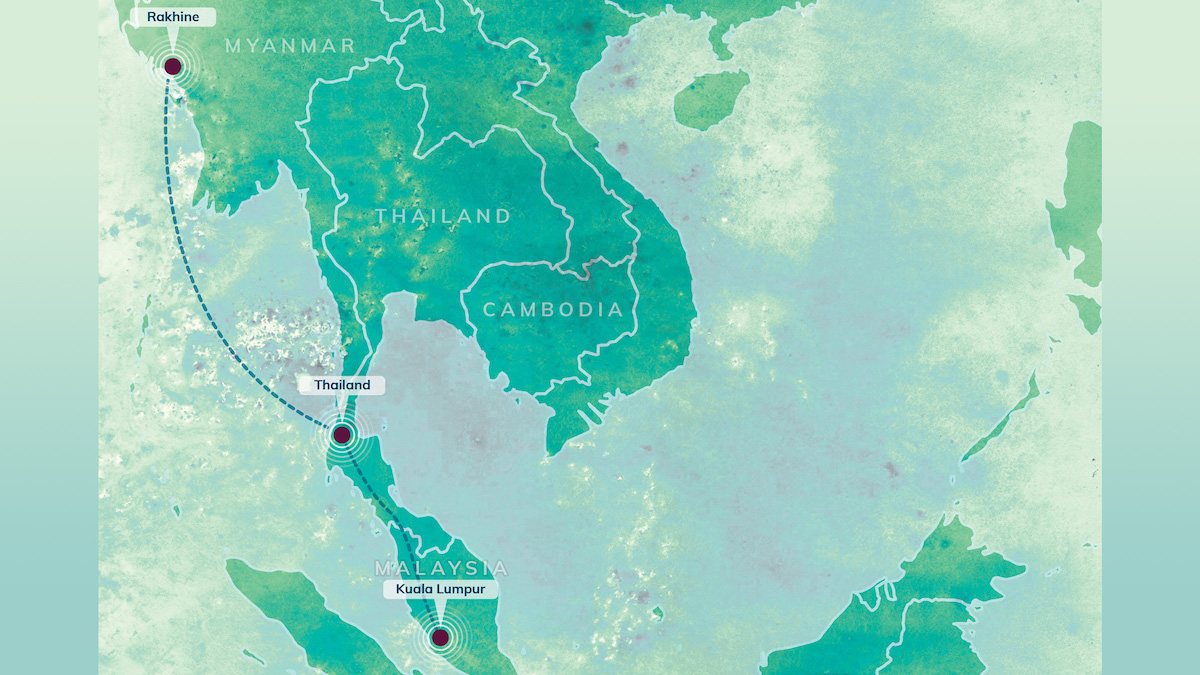The following story was originally compiled for the Mixed Migration Review 2020 and has been reproduced here for wider access through this website’s readership.[1]
I have lived in Kuala Lumpur for one-and-a-half years. I came here from Rakhine state in Myanmar to reunite with my husband who had come here earlier. We had a baby a year ago.
I set off on my own, but on the way here I saw some people from my village who were also coming to Malaysia, so we travelled together. First, we went to Thailand by boat, then from Thailand we went to Malaysia, and I came to Kuala Lumpur by bus.
We used smugglers to get here. The journey was very difficult. They asked us for 7,000 Malaysia ringgits ($1,700) per person before the journey. On the way, we were kept at a camp where the smugglers called our family members back home and asked for money. Everyone was in the same situation.
When I first arrived in Kuala Lumpur, I was very scared. There were a lot of new people in this new place. But the longer I stay, the less fear. I see Kuala Lumpur as my second home because it is better than my home country. I can live here more freely. I can eat whatever I want to eat, I can take care of my baby, there no medical barriers, I can go to clinics if I want. Kuala Lumpur is also a nice place with a city lifestyle, there are many items for shopping. In Rakhine, Rohingya are persecuted, they are facing harassment and are unsafe.
Rohingya people live in many different parts of Kuala Lumpur. In the place where we are living, there are a lot of Rohingya around. It is not in the city centre, but that is only one bus trip away. There are markets around our place, but I never went to any shopping malls here.
We rent a two-room apartment here. Because it is very expensive, my family share the flat with another family. At the moment, we did not see any one catching Covid-19 in our place yet. I got tested for Covid-19 and it was negative.
I haven’t experienced any discrimination here. If I go to clinics to get checked up, I will have an interpreter. There is no discrimination in the markets as well. But I heard that since Covid-19, there are hate speeches against us, asking us to go home because they hate Rohingya.
I myself don’t work. I depend on my husband. He works in the construction sector. Normally he gets paid monthly, but sometimes his pay is delayed for two months. With the Covid-19 pandemic, his boss asked him not to come to work again, so he moved to other construction sites to look for work, without much success. We haven’t paid our rent for so many months. If it continues, the landlord will drive us out. We also cannot send any money back home. I know a lot of people are in our situation. Since the start of Covid-19, I received some food packages from many NGOs, but they are not enough for my whole family. Sometimes we need milk powder for the baby. My baby cries a lot.
We did not get support from other community members. They all have their own family and they have to care about their own family. Other migrant communities are living separately from Rohingya people here
I don’t have any [residency] document here. I applied for the UNHCR asylum process, but it did not start yet. I know two people who got arrested. They are now still in detention centres. My husband is very scared of being arrested and he is not going out, even for work. He also does not have any documentation, like work permit or residence permit. There are policemen everywhere in the markets and supermarkets.
We have some friends and relatives from Rakhine state who want to move here as well. Previously, I wanted to bring my family to come here, because at that time, nothing happened to us. But now I am not willing to bring them here anymore since many local people are not happy with us. The smuggling costs are higher too.
I have two dreams: First, I want my children to get education. Refugee children in Malaysia cannot go to the government’s schools, they can only study in community schools with not good education. Second, I hope there would be no more arrests, so that people can live freely here.
We have no intention of moving to another place. My husband speaks a bit of Malay so we may just stay here. I sometimes dream of going back to Rakhine state when the situation gets better. Only if there is no more killing, no persecution, no displacement, and only if I could live like other ethnic groups in Myanmar, I would like to go back.
I would like to thank Malaysian government who hosts us here, where we can live better than Rakhine state. I just wish there would be no arrests and that my children could get a good education here.

[1] ‘Urban Voices’ presents seven stories from migrants and refugees living in cities drawn from detailed individual interviews conducted by MMC. They often illustrate the non-linear nature of so many migrant and refugee journeys – characterised by the twists and turns in many migrants’ erratic lives. They serve to offer evidence towards a new concept recently introduced in migration studies of circumstantial migration to describe how “migration trajectories and experiences unfold in unpredictable ways under the influence of micro-level context and coincidence.” [Carling, J. and Haugen (2020) Circumstantial migration: how Gambian journeys to China enrich migration theory. Journal of Ethnic and Migration Studies.] MMC did not record the names of respondents and all names in this ‘urban voices’ series are aliases.